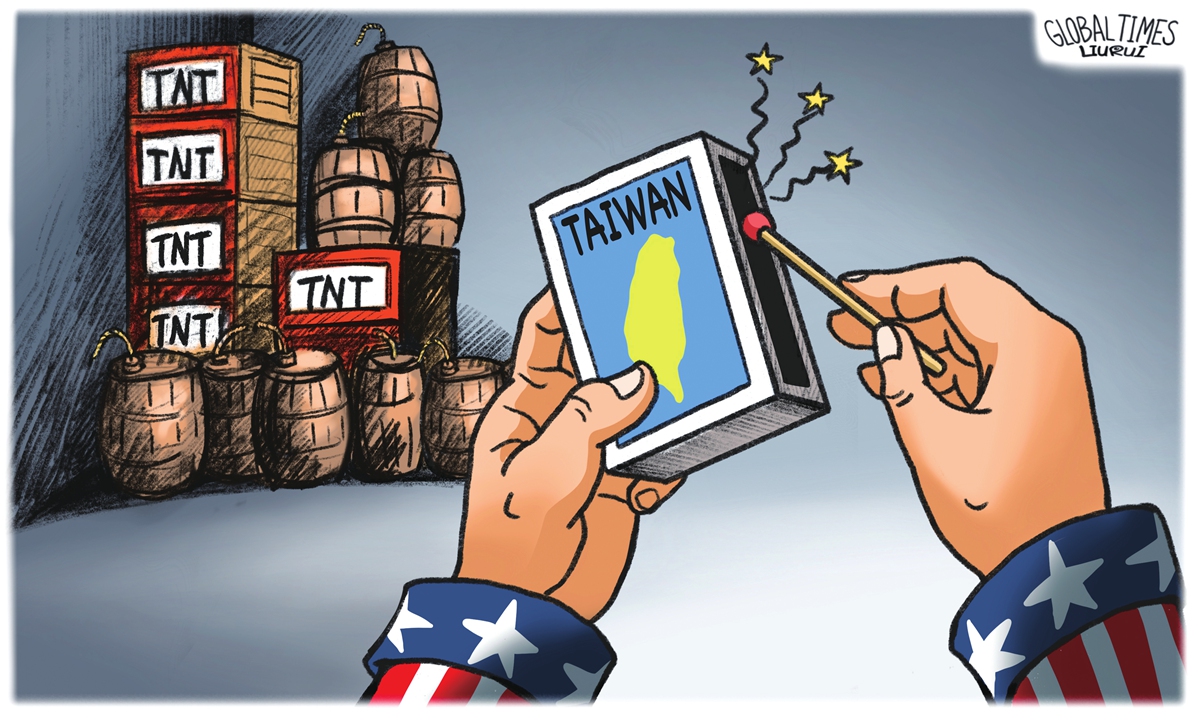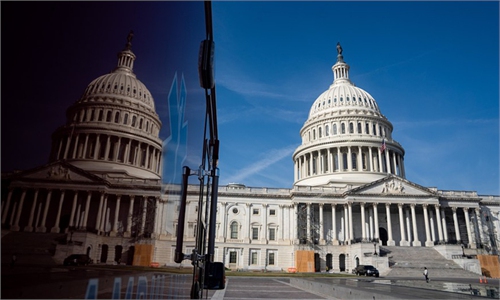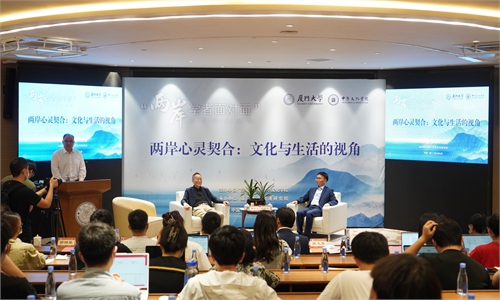
US TAIWAN Illustration:Liu Rui/GT
The past few years have witnessed a steadily rising state of tension across the Taiwan Straits, mainly due to US' growing interference in China's Taiwan question and notably a strengthening of its military collusion with the Taiwan region. Against this background, some people from both the Taiwan island and the US are debating over and advocating for more aggressive moves against the deterrence from the Chinese mainland.Some recent remarks by Joseph Wu, leader of the external affairs authority of the Taiwan region, have added fuel to these ongoing debates. Wu suggested last week that the authorities of the Democratic Progressive Party (DPP) had been in communication with "good friends" regarding the possibility of placing the Taiwan island under US nuclear umbrella.
It should be noted that the so-called "nuclear umbrella" is a term that was coined in the early period of the Cold War, which is usually referred to US commitment to defending its security alliances, including Japan, Republic of Korea, and the North Atlantic Treaty Organization (NATO). If Wu was quoted right, it means that Americans - whom he calls "good friends" - are about to apply this outdated yet dangerous concept in the Taiwan Straits.
Given some obvious legal and realistic challenges that the US may be confronted, however, it might turn out to be the DPP authorities' wishful thinking to expect to be "protected" under US nuclear umbrella.
First, the Taiwan region is not a US treaty ally and fails to meet the legal conditions where the US would come to Taiwan's "rescue" with any nuclear weapons. While the US has attempted to hype the Taiwan region as its "major non-NATO ally" in recent years, it is just a far cry from a formal ally and therefore is short of legal basis should Taiwan seek for US nuclear "protection."
Besides, US security commitments to its East Asian allies have always been questioned. Media and scholars from, for example, Japan and Republic of Korea have been doubting the validity of US security commitments. US commitments to its long-time allies have even been called into questions, let alone its alleged commitments to the Taiwan region.
More critically, putting Taiwan under the US nuclear umbrella would be tantamount to giving up Washington's "one China" policy altogether. Since the establishment of diplomatic ties with China 40 plus years ago, the US has gradually reduced its adherence to the one China principle into a "one China" policy to adapt to its competition policy against China. Still, the US is bound by the "one China" policy on cross-Straits affairs. Nevertheless, if the US attempts to put Taiwan into its nuclear umbrella, it would be likely viewed by the Chinese mainland as a complete abandonment of the "one China" policy.
In the context of continued political deadlock in cross-Straits relations, growing tension in China-US ties, and strengthening collusion between the Taiwan region and the US, putting Taiwan into its nuclear umbrella and abandonment of its "one China" policy are all the more provocative. It is impossible for American political elites to include Taiwan into their nuclear umbrella without taking into account the Chinese mainland's key concerns and reactions.
Lastly, the mainstream strategic circle that has long dominated US' Taiwan policy is committed to maintaining the dynamic balance of cross-Straits relations under the policy framework of strategic ambiguity. A vast majority of experts from this mainstream circle reject the US government's ongoing efforts to strengthening ties with the Taiwan region at the expense of the Chinese mainland's security interests.
While it is less likely for the time being that the US would put the Taiwan region into its nuclear umbrella system, one should not rule out the possibility. The voices of the so-called "militarily defending Taiwan" are getting louder in Washington in the context of China-US strategic competition. A few scholars in Taiwan are also advocating that US nuclear umbrella would help upgrade the island's deterrence.
With that being said, neither does the US have legal basis for putting Taiwan into its nuclear umbrella nor could it ignore strong opposition and reactions from the Chinese mainland as a nuclear power. For the DPP authorities, their efforts to come under US nuclear umbrella are more than just dangerous that may cause disastrous consequences. It would turn out to be their wishful thinking on this issue.
The author is an assistant professor at the School of International Studies, Nanjing University. He regularly writes on comparative politics and international relations, with an emphasis on the Taiwan question and China-US relations. opinion@globaltimes.com.cn


